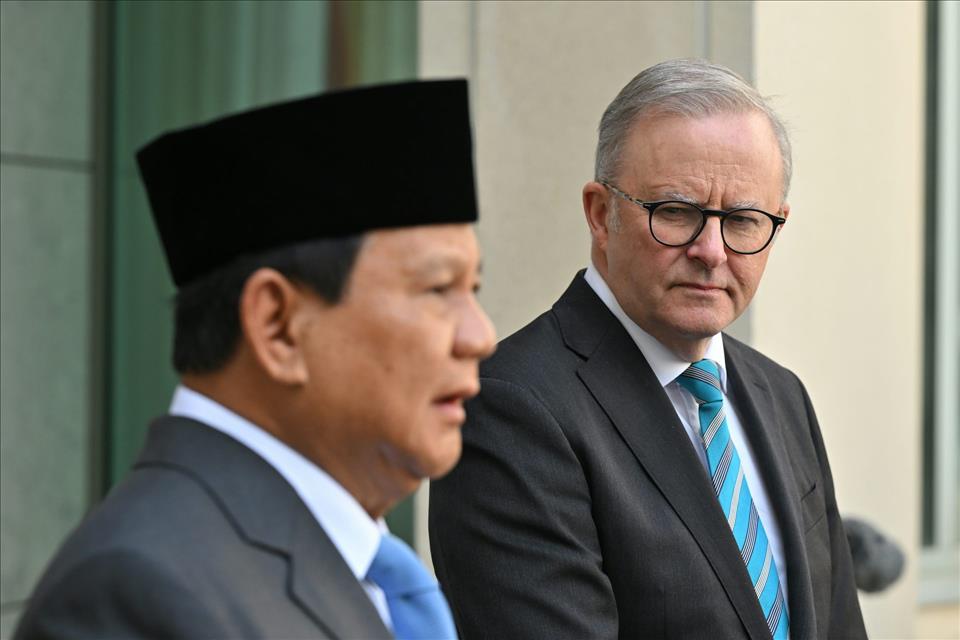
In Indonesia, Albanese Has A Chance To Reset A Relationship Held Back By Anxiety And Misperceptions
With both nations entering new political chapters, the visit carries symbolic weight. But it will also have practical importance.
Despite the two nations' proximity and strengths, the relationship has often been held back by outdated perceptions and strategic hesitation. This is a timely opportunity to reset the relationship.
Prabowo's emerging foreign policyPrabowo succeeded outgoing President Joko“Jokowi” Widodo in October after a decade of his infrastructure-driven and globally engaged leadership.
Prabowo, a former army general and defence minister, had projected a populist and nationalist image during his 2024 election campaign. He frequently emphasised Indonesia's food self-sufficiency, military strength and national sovereignty.
Prabowo easily won last year's election without going to a run-off. Trisnadi/AP
Since taking office, however, he has moderated his tone. While seen by some in the West as assertive, he has signalled a willingness to strengthen bilateral defence ties with Australia. He also has an interest in modernising Indonesia's military and engaging more transparently with partners.
Still, questions remain about how he will shape Indonesia's foreign policy. This includes whether he will maintain Jokowi's emphasis on multilateralism and economic diplomacy. Both are key to the tone and outcomes of Albanese's visit.
Prabowo's leadership style is nuanced. Despite his polarising image, Indonesia's foreign policy is still shaped by pragmatism and non-alignment. As such, Prabowo will likely focus on balancing relations with China, the United States and Russia, while protecting Indonesia's sovereignty.
Indonesia's decision to join BRICS , the economic group that includes both China and Russia, for example, should be seen as a diplomatic hedge, not a new geopolitical alignment.
Other recent decisions, such as providing aid to Fiji , suggest an increasingly outward-facing regional posture.
Albanese should offer Prabowo credible alternatives to Russian and Chinese engagement through trade, technology and education exchanges, rather than reacting to Jakarta's moves with suspicion.
Opportunities for cooperationIn his election campaign, Albanese reaffirmed his government's commitment to working closely with Southeast Asia. He also promised a foreign policy grounded in diplomacy, climate cooperation and economic diversification.
This provides a strong incentive for both leaders to deepen ties. For Australia, deepening ties with Indonesia supports its Indo-Pacific strategy. The goal: promoting a stable and inclusive regional order, particularly amid concerns over growing strategic competition between the US and China.
For Indonesia, Australia offers investment, education partnerships, and critical expertise in clean energy and innovation.
A free-trade agreement signed in 2019 provides a platform for deeper integration and less competition in certain industries.
For example, there are huge opportunities to collaborate in clean energy, particularly after the neighbours signed a climate partnership last year. The agreement will secure supplies of lithium for Indonesia's EV battery production, while Australia will gain more export markets for its critical minerals.
People-to-people ties are also vital, while education remains a longstanding pillar of the bilateral relationship.
Both countries face skills shortages in key sectors. Indonesia needs skilled workers in health care, clean technology and digital literacy. Australia has shortages in critical infrastructure, aged care and engineering.
There are good opportunities here for student exchanges, joint employment training programs and other vocational collaborations.
New Australian university campuses in Indonesia are a positive step, but they remain commercially focused and concentrated in elite, urban areas. With over 4,000 universities across the archipelago, these partnerships could go much further.
Where tensions might ariseThe relationship is not without friction. Australia's involvement in the AUKUS agreement, and its close alignment with the United States and United Kingdom, has raised concerns for Indonesia, which has long championed non-alignment.
Jakarta has voiced unease over the perceived risks of nuclear submarine proliferation in the region.
Albanese's visit is a key opportunity to clarify that AUKUS involves nuclear-powered - not nuclear-armed - submarines. He should also reinforce Australia's commitment to transparency over the deal. This is essential to avoiding misunderstandings and building trust.
A more recent flashpoint is speculation around a possible Russian military presence in Indonesia - a claim the Indonesian government has firmly denied.
Indonesia's response exemplifies its longstanding commitment to strategic autonomy. However, the whole ordeal reveals the complexity of Jakarta's foreign relations, which often involve balancing ties with competing powers.
For Australia, acknowledging Indonesia's independent foreign policy - rather than interpreting it through a great-power rivalry lens - is critical to sustaining mutual trust.
Russian President Vladimir Putin, right, and then-Indonesian President Joko Widodo shake hands after a joint news conference in Moscow, Russia, in 2022. Alexander Zemlianichenko/AP A chance to re-anchor the relationship
This moment offers both governments the chance to move beyond symbolic gestures toward a deeper, more inclusive and people-centred partnership.
Amid global fragmentation, trust is not just desirable - it's essential. And while differences remain, they are not insurmountable when guided by mutual respect, strategic patience and a commitment to genuine cooperation.
For Australia, the challenge is to move past strategic anxiety and invest in a resilient, multidimensional relationship with Indonesia. This visit could be the first step in doing just that.

Legal Disclaimer:
MENAFN provides the
information “as is” without warranty of any kind. We do not accept
any responsibility or liability for the accuracy, content, images,
videos, licenses, completeness, legality, or reliability of the information
contained in this article. If you have any complaints or copyright
issues related to this article, kindly contact the provider above.






















Comments
No comment